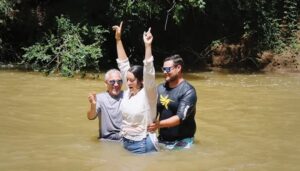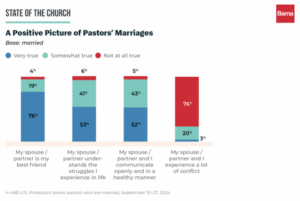
BUJUMBURA, Burundi (BP)–A Southern Baptist missionary has issued an urgent call to prayer for hundreds of thousands of people in Burundi trapped in squalid camps without food, shelter or sanitation.
As many as 800,000 Hutu civilians have been forced into the detention camps outside the capital, Bujumbura. Burundi’s Tutsi-dominated government hopes the strategy will stymie attacks by Hutu rebels entrenched around the city.
Southern Baptist missionary David Brandon says many observers consider the settlements to be little more than death camps.
“Starvation is a reality, diseases are increasing and thousands of people are lying in a fetal position, waiting to die,” Brandon said. “Humanitarian aid organizations are not doing anything because of the United Nations killings.”
Brandon referred to an Oct. 12 attack in which two U.N. aid officials were killed while visiting a detention camp southeast of the capital. While the government blamed the attack on Hutu rebels, others believe it was an assassination coordinated by the Tutsi-dominated military to force aid agencies to leave and put more pressure on the rebels.
The United Nations drastically reduced its staff in Burundi after the attack and aid groups like Doctors Without Borders suspended their operations as well.
Brandon found himself frustrated and helpless as multitudes of defenseless people starved to death in camps to which he had no access.
“People have been surviving by selling anything they can to get food money and, more recently, by stealing from local fields or from others in the camps,” said Brandon, who was appointed by the International Mission Board as an agricultural evangelist to Burundi in 1990. “Now the rainy season has started, which will drastically increase dysentery and cholera and weaken everyone, as most have no shelter whatsoever.”
With $5,000 from Southern Baptist hunger and relief resources, Brandon aided a few families suffering in the camps before he was forced to leave the country Nov. 12 because of unrelated visa complications. He and his family have taken up temporary residence in Nairobi, Kenya.
Working through local Christians, some of whom were themselves detained in the camps, Brandon supplied food and malaria medicine to about 220 destitute families in three weeks before he and his wife, Cathy, were forced to leave the country.
“We heard several stories about how people were praising God for delivering them from starvation. Some of them hadn’t had any food in three days,” Brandon said. “It wasn’t easy to leave, knowing their situation was not improved, but it made a significant impression on hopeless people and gave newcomers enough food to live on for at least 10 days.
“The greatest value, however, was in the empowerment of the local Christians to help,” he added. “They were only a step above the families they helped in terms of food security. They often are faced with tough choices in helping others when they themselves have no surplus. They were very joyful to have the responsibility and ability to help.”
The current atrocity in Burundi recalls the 1994 genocide of 500,000 Tutsis in neighboring Rwanda. Fearing the domination of the minority Tutsi tribe and angered by the assassination of the country’s Hutu president, Rwandan Hutus launched a genocidal campaign that ended only after a Tutsi military force drove the Hutu government into exile. Fearing retaliation for the genocide, more than 2 million Rwandan Hutus fled into neighboring countries.
Now the Tutsi-led government and military in Burundi have placed hundreds of thousands of Hutu lives in danger as they try to counter the siege Hutu rebels have set against the capital city.
The turmoil in both countries reflects a bitter, centuries-old rivalry between Nilotic tribes of northeastern Africa and Bantu tribes of southeastern Africa, says David Garrison, the International Missions Board’s associate vice president for strategy coordination and mobilization. The same tribal rivalries also fuel the regional war boiling in the Democratic Republic of the Congo (formerly Zaire).
More than 200,000 Burundian Hutus, many of them educated leaders, died in massacres in the early 1970s. A second genocide that claimed 150,000 Hutu lives swept the country in 1993 after Tutsi paratroopers assassinated the country’s first democratically elected president, a Hutu. The 400,000 Hutus who then fled into Rwanda set the stage for the Rwanda genocide the next year.
“This is an African race war between Bantu and Nilotic races,” Garrison said. “The atrocities in the region reveal the depravity that lurks just below the surface of us all.”
The conflicts also reveal the destructive power of Satan and the futility of cultural Christianity to change people’s lives, Garrison said.
“The wife of the former Rwandan Hutu president reportedly was practicing black magic and many believe she stimulated much of the genocide there,” Garrison said. “And the vast majority of the people involved on both sides of the conflict are nominal Christians. They were baptized as infants but never have experienced the transforming power of the Holy Spirit.
“The frightening thing is that we’ve seen atrocities like this all over the world in the 20th century,” he added. “The overwhelming lesson I see is that the people who do things like this are just like us. We’re all only a step or two away from this insanity.”
The fact that Western governments and the mass media largely are ignoring these people’s plight means large-scale public pressure won’t be brought to bear on the Burundi government — and the people will continue to suffer, Brandon said.
“It’s just obvious that the whole situation is too evil for the West to get involved in,” he said. “Plus, they have no political or economic reason to get involved. The media look the other way in disgust.”
The concerted prayers of God’s people may be the only hope for people suffering in the camps, Brandon said.
“Donations are not the solution here,” he said. “Even if we were in the country, there is no access to the camps.
“Pray that God will intervene in the political quagmire that is creating the situation. Pray that the Christians in the camps would be strong in their faith. Pray for unrelenting peace and security in the Lord to enter the hearts of true believers who face the enormous pressure of fear.
“And pray for the Lord’s direction in our future work in Burundi. Our legal ability to return is not guaranteed and work decisions are difficult.
“We have been sustained by prayer and we depend on it.”
–30–













